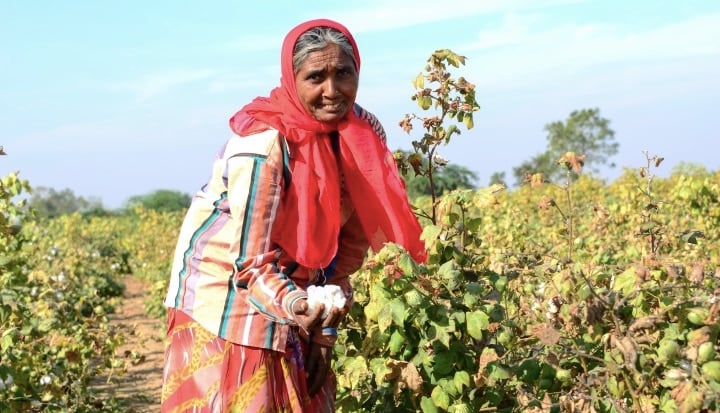While the clock ticks every second, the global climate continues to change…
Humankind has faced the brunt of unprecedented climatic events in the past decade. As the impending harsh future looms large, it will be a difficult environment for humans and businesses, unless collective steps are taken to build an equitable and resilient future, in line with the efforts and direction of partners like Business Fights Poverty.
CottonConnect, a social organization with the vision of Reimagining the future for supply chains, helps global brands source more fairly and sustainably by creating more robust, resilient and successful raw material supply chains.
Cotton is the most widely used natural fabric for apparel manufacturing across the world. India, China and Pakistan are major producers of cotton worldwide and CottonConnect works closely with the farmers in these countries.
CottonConnect’s sustainable REEL Cotton and Organic programmes have focused on delivering positive results to the farmers and the environment: reducing water use, reducing chemical pesticide and fertilizer use, leading to reduced input costs and improved incomes.
The effects of climate change on cotton farming
Extreme climate events are predicted to bring acute water shortage, increased temperatures, and reduced rainfall. These changes in the climatic conditions will hit the developing countries with agro-based economies the most as resources are scarce, the ability to cope with these calamities is insufficient and will severely implicate future productivity, livelihoods and economic growth.
We learnt by listening to women farmers in India and Pakistan in CottonConnect’s sustainable REEL Cotton and Organic programmes that climate change already affects all areas of women’s lives – on the farm, caring for livestock, and in the home. In turn, this has a profound impact on their income, time and health.
The economic impact will additionally deepen the health issues of the labour-intensive farmers who will continue to work manually in such extreme conditions.
Taking a people-centred approach
We recommend that any climate mitigation in cotton farming takes a people-centred approach. At CottonConnect, we are looking to work much more closely with the farmers to educate and alleviate the changes on their livelihood in a more focused manner, backed by government laws, research and best practices. We are working to create climate resilient farming communities who can understand the challenges caused by climate change on their farms and livelihoods and practice farming in a smart way.
Additionally, we are educating the women farmers to improve farm profitability, to adapt their crop planning according to the changed climate cycle and working on gender-specific training on sustainable and socially responsible agricultural practices.
We plan to create a cadre of trained women as climate smart change leaders who can work at grass root level and guide farming communities about climate change issues for a longer time period. These climate smart leaders will act as a bridge between farmers and CottonConnect to bring change at grass root level. For this we would be happy to collaborate with other partners.
Creating partnerships
We plan to work on newer technological advancements and better farm management practices to improve irrigation systems, working with government bodies and other national and global agencies to work on climate smart agricultural research and interventions for long-term impact.
We want to partner with other organizations who would like to support farmers in terms of technology and other interventions to address the issues of climate change.
CottonConnect looks forward to take meaningful steps along with its business partners to mitigate the effects of climate change, allowing nature to sustain and revive itself. Protecting nature today means a better planet for future generations.










